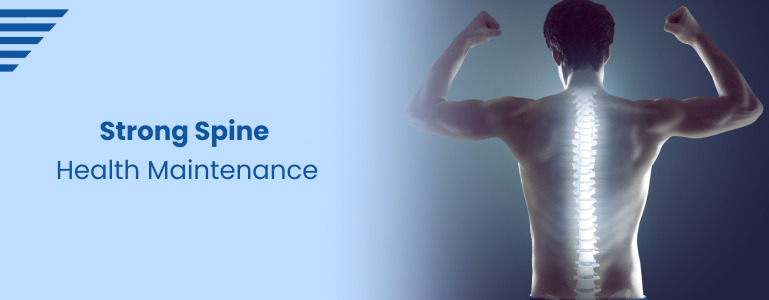Maintaining Strong Spine Health: Lifestyle Tips and Exercises

Our spine is the backbone of our body, quite literally. It plays a vital role in supporting our posture, facilitating movement, and protecting the delicate spinal cord. However, like any other part of our body, the spine requires care and attention to stay strong and healthy. In this blog, we'll explore some essential lifestyle tips and exercises to help you maintain a robust spine. We'll also touch upon the importance of Bone Densitometry Spine tests in monitoring your bone health.
Why Spine Health Matters
Before diving into the tips and exercises, let's understand why maintaining a healthy spine is crucial. The spine consists of 33 vertebrae that provide structural support to our body. It also encases the spinal cord, responsible for transmitting messages between the brain and the rest of the body.
Here are a few reasons why spine health should be a priority:
Plasmapheresis: A procedure to remove cryoglobulins from the blood.
Antiviral therapy: For hepatitis C-related cryoglobulinemia.
Immunosuppressive drugs: To reduce inflammation and manage autoimmune responses.
Now, let's delve into some lifestyle tips and exercises to promote strong spine health.
Home Sample Collection
Lifestyle Tips for a Healthy Spine
Core Strengthening: Planks, bridges, and leg raises can strengthen your core muscles, which support your spine.
Stretching: Gentle stretches like cat-cow or child's pose can alleviate tension in the spine.
Yoga and Pilates: These practices focus on flexibility, balance, and core strength, promoting spine health.
Low-Impact Aerobics: Activities like stationary biking or elliptical training can improve spinal health without causing excessive strain.
Back Extensions: Perform exercises like the cobra or superman pose to strengthen the muscles along your spine.
The Role of Bone Densitometry Spine Tests
While lifestyle tips and exercises play a crucial role in maintaining spine health, it's essential to monitor your bone density, especially as you age. Bone Densitometry Spine test, often performed using DXA or QCT scanning techniques, measure the density of your spinal bones. These tests can help identify conditions like osteoporosis and assess your risk of fractures.
Conclusion
A strong and healthy spine is essential for your overall quality of life. By adopting lifestyle tips and incorporating spine-strengthening exercises into your routine, you can take proactive steps to maintain your spine's health. Additionally, don't forget the significance of Bone Densitometry Spine tests in monitoring and preserving your bone health. Prioritizing your spine health today can lead to a more comfortable and active future.
Frequently Asked Questions
Why is maintaining spine health important?
Maintaining spine health is crucial because the spine provides structural support, enables mobility, and protects the spinal cord. A healthy spine can help prevent chronic pain, improve posture, and support overall well-being.
How does poor posture affect spine health?
Poor posture can strain the spine's supporting muscles and ligaments, leading to discomfort and potential long-term issues. It can also contribute to conditions like forward head posture or kyphosis.
What types of exercises are best for strengthening the spine?
Exercises that focus on core strength, flexibility, and posture are excellent for spine health. Examples include planks, yoga, Pilates, and low-impact aerobics.
Is lifting heavy objects harmful to the spine?
Lifting heavy objects improperly can strain the spine and increase the risk of injury. To lift something properly, you must bend at the knees and keep the object close to your body.
Can I improve spine health through diet and hydration?
Yes, a balanced diet rich in calcium and vitamin D can support bone health, including spinal bones. Staying hydrated helps maintain the elasticity of spinal discs.
Are there specific lifestyle changes to prevent age-related spine issues?
Yes, staying physically active, quitting smoking, maintaining a healthy weight, and practicing good posture are essential lifestyle changes to prevent age-related spine issues like osteoporosis and degenerative disc disease.
When should I consider getting a Bone Densitometry Spine test?
If you have risk factors for bone density loss (e.g., family history, postmenopausal status, certain medications), consider discussing a Bone Densitometry Spine test with your healthcare provider. Regular testing is recommended, especially as you age, to monitor bone health and detect conditions like osteoporosis early.
Book Your Slot
Our Locations Near You in Hyderabad
3KM from Banjara Hills
1.9KM from Yusufguda
3KM from Madhura Nagar
5KM from Shaikpet
Profiles
- Cardiac Risk Profile
- Pituitary marker Profile
- Rheumatoid Arthritis Profile
- Dengue Fever Panel
- Lung Cancer Panel 1 Complete Molecular
- Gastroenteritis Screening Panel
- Thyroid Profile (T3,T4,TSH), Serum
- Pancreatic Marker Profile
- STD profile
- Androgen Profile
- Lipid Profile, Serum
- Pancreatic(acute)Profile
- PCOD Profile
Radiology
Pathology Tests
- Glucose Fasting (FBS),Sodium Fluoride Plasma
- Creatinine, Serum
- Glycosylated Hemoglobin (HbA1C)
- Vitamin B12 (Cyanocobalamin), Serum
- Thyroid Stimulating Hormone (TSH) Ultrasensitive, Serum
- Complete Urine Examination (CUE), Urine
- Liver Function Test (LFT),Serum
- Dengue (IgG & IgM), Serum
- Dengue Antigen (Ns1) Rapid, Serum
- C-Reactive Protein (CRP), Serum
- Widal (Slide Method), Serum
- Total IgE, Serum




